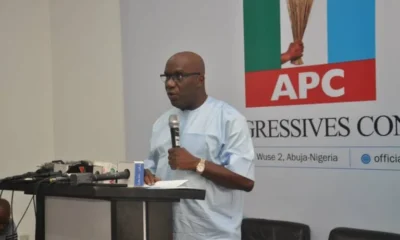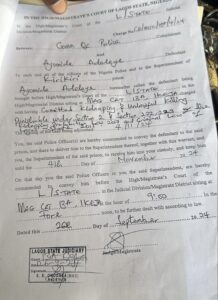Oil marketers have started loading Automotive Gas Oil (diesel) and Kerosene from the Warri Refining and Petrochemical Company.
Dealers confirmed this on Friday, while also requesting Premium Motor Spirit (petrol) from the recently rehabilitated plant.
WRPC, under the management of the Nigerian National Petroleum Company Limited, resumed operations on December 30, 2024, after the Group Chief Executive Officer of NNPCL, Mele Kyari, announced its return to service during a tour of the facility.
Speaking with one of our correspondents at the refinery on Friday, the Chairman of the Delta State chapter of the Independent Petroleum Marketers Association of Nigeria, Harry Okenini, said that while the plant was operational, it was not yet functioning at full capacity.
He, however, pointed out that marketers had begun loading diesel and kerosene from the refinery.
“Right now, there is no production of petrol. So, we are not loading PMS. We hope to load PMS soon. We can confirm to you that the plant is working although not at 100 per cent. And IPMAN, Warri Depot Unit, is waiting for the production of PMS so that we can load.
“For now, only the Automotive Gas Oil, popularly called diesel, and Dual Purpose Kerosene are being produced and loaded out for consumption.
“Hopefully, by February, we are expecting cooking gas, PMS, and other products to come out. As of now, the retail unit is only loading AGO and DPK,” he added.
Also speaking with our correspondents at the refinery, the National Chairman of the Surface Tank and Kerosene Peddlers, a branch of NUPENG, Israel Omokere, confirmed that the refinery was operational.
He said, “Hopefully, the PMS will come on board. We are loading kerosene and AGO for now.”
On his part, the Delta State Chairman of Surface Tank and Kerosene Peddlers branch of NUPENG, Kingsley Erituoyo, said, “For so many years the refinery was down, today the refinery is up.”
Findings at the Warri refinery by our correspondents showed limited truck movements in and out of the complex.
According to The Punch, the activities at WRPC were minimal compared to the refinery’s peak years when it operated at full capacity.
Industry sources revealed that more steps were needed by the Federal Government and NNPCL for the refinery to begin full production of PMS.
During the visit to the WRPC complex, it was also observed that the main entrance appeared almost deserted, with security operatives stopping journalists from taking photographs on the premises.
Sources inside the refinery shared that only one of the three units at the refinery was operational and producing diesel, gas, and kerosene.
“For now, only one unit is working at the refinery. You know there are three units, but only one is in operation, producing diesel, gas, and kerosene.
“The unit can’t give fuel for now. If the second unit starts working, it can produce PMS. It is the last unit to operate because it’s very big and complicated.
“If all units are working, we can load over 100 trucks daily, now it loaded about 50 trucks,” a source said.

 BIG STORY3 days ago
BIG STORY3 days ago
 BIG STORY4 days ago
BIG STORY4 days ago
 BIG STORY4 days ago
BIG STORY4 days ago
 BIG STORY4 hours ago
BIG STORY4 hours ago
 BIG STORY4 days ago
BIG STORY4 days ago
 BIG STORY2 days ago
BIG STORY2 days ago
 BIG STORY3 days ago
BIG STORY3 days ago
 BIG STORY2 days ago
BIG STORY2 days ago
















